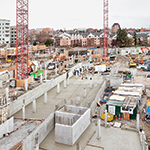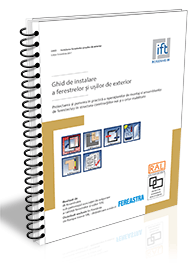| Almost 9.2% growth of investments in local economy |
| English Section 23 Apr 2012 08:00 |
 Investments in national economy grew last year by 9.2% as against 2010, reaching over RON 64.5 billion, and totalling RON 24.8 billion in the fourth quarter, 22.1% over the level recorded in the same period of the previous year, according to the National Institute of Statistics (INS) data. Investments materialized in construction works totalled last year RON 31.9 billion, representing 49.5% of the total, as against the 51.2% in 2010, while funds earmarked to equipment and transport means amounted to RON 26.3 billion, namely 40.8% of the total, as against the 38.4% in all the previous 12 months. At the same time, the total volume of real estate investments transacted last year was approximately EUR 400 million, the most significant being the acquisition of the entire regional portfolio of the Europolis fund by CA Immo, according to the quarterly report "Bucharest City Report", drawn up by the consultancy company Jones Lang LaSalle (JLL) for the last quarter of last year. Investments in national economy grew last year by 9.2% as against 2010, reaching over RON 64.5 billion, and totalling RON 24.8 billion in the fourth quarter, 22.1% over the level recorded in the same period of the previous year, according to the National Institute of Statistics (INS) data. Investments materialized in construction works totalled last year RON 31.9 billion, representing 49.5% of the total, as against the 51.2% in 2010, while funds earmarked to equipment and transport means amounted to RON 26.3 billion, namely 40.8% of the total, as against the 38.4% in all the previous 12 months. At the same time, the total volume of real estate investments transacted last year was approximately EUR 400 million, the most significant being the acquisition of the entire regional portfolio of the Europolis fund by CA Immo, according to the quarterly report "Bucharest City Report", drawn up by the consultancy company Jones Lang LaSalle (JLL) for the last quarter of last year."At the same time, we also assisted the second forced execution, after that of the commercial centre Tiago Mall Oradea in 2010; City Mall was taken out of the market by UniCredit Bank and purchased by a local developer, one of the unit’s ex-owners. On the office space transaction market, Bluehouse Capital closed the transaction for possessing the Astoria Centre building, following a EUR 10 million investment", as shown in the quoted document. For this year, the JLL analysts estimate that the total value of real-estate transactions will exceed the level reached last year. We must mention that specialists have noticed a return of interest in the project stage acquisitions («forward» type), but the demand is only expressed for exceptional units, whose development is sustained by the market demand contraction. "Considering that project funding will be extremely selective and will face, in the following months, additional restrictions generated by the new regulations, almost all units - except for those of «prime» category office spaces, located in areas of interest or dominant commercial centres - will continue to be the least transacted. Considering that the project funding term is generally 5-7 years, we estimate that many real-estate credits will reach maturity in 2012 and consequently, the number of refunding requests will grow. As most real-estate loans were granted between 2006-2007, the LTV clause was finally infringed (loan value as against the product market value) for most credits, currently owners facing the difficult situation of having to contribute with own capital to recover the LTV ratio, according to the contractual clauses", as also specified in the JLL analysis. An important effect of the respective funding is represented by the fact that drawing loans for project development is not difficult, and the pressure thus created on the future offer of office spaces generates new opportunities for institutional developers, aiming at accessing the market with international standard, qualitatively superior projects.
Optimal evolution of credits granted for the constructions sector
Last year, financial institutions financed assets totalling EUR 1.35 billion, according to the data published by the Association of Financial Institutions - ALB Romania, approximately 25% thereof (EUR 339 million) being granted in the equipment sector, 7% (EUR 93 million) in the real-estate sector and 68% (EUR 917 million) in the transports segment. As for credits approved for equipment, the share of those used in the construction sector grew from 13% in 2010 to 19% last year, mirroring the respective sector’s growing trend. Also, the electrical equipment share grew from 4% to 10%. As regards the real-estate market, the ALB Romania release mentions: "the crisis period (2009 - 2011) indicates new trends in the building sector funding in terms of the share per category. Thus, the data available in December 2011 indicates a drop to 24% (from 37% in 2010) in the share of A, B and C class office space financing, while the share of credits granted for commercial centres (retail, outlet type) dropped significantly, from 31% to 6%. On the contrary, the share of industrial building financing grew in the analyzed timeframe from 17% to 36%, that of hotel spaces from 1% to 2% and of land from 9% to 28%". This situation was generated by financing the "sale and lease back" type of contracts - which represent the sale by an enterprise (which will become a tenant/ user) of own immobilizations to a crediting company, followed by their immediate takeover in leasing. The system represents an optimal solution for obtaining liquidities necessary during crisis for financial leasing contract clients, at the same time as an orientation of funding towards sectors ensuring conformity with the National Bank of Romania (BNR) norms. The ascending trend of residential building financing also maintained, and therefore the current maintenance of the prudent policy related to natural person crediting.
Possible drop of raw material quotation at an international level
Raw material quotation growth, currently affecting producers’ profitability, including construction material producers worldwide might slow down in the near future, International Monetary Fund (IMF) specialists even warning exporting countries of a difficult economic solution at least for 2012. This is good news for producers, who would have the possibility to stabilize their business, currently affected by huge pressure generated by a demand/ consumption drop, the maintenance of competitive prices on the market and profitability requirements. According to the IMF, oil price is an important factor in the economy, generating the raw material price evolution and, in case its costs undergo a considerable increase (following supply flaws), the world growth will be influenced, leading to other raw material price drops. At the same time, the IMF experts analyze, in the current edition of the "World Economic Outlook" study, the role of households' debts in the 2007 financial collapse and the subsequent relaunch. Thus, the institution experts claim that in countries such as Great Britain, the USA, Spain and Ireland - where the real-estate market crash lead to a higher population indebtedness level - the economic relaunch will take longer. "The decline recorded by household consumption and the real Gross Domestic Product (GDP) are significantly higher, unemployment is growing and the economic activity drop lasts for at least five years. Recessions preceded by significant growths of household debts are more severe", as shown in the IMF report. The solution recommended by the institution targets a monetary policy relaxation in the economies with variable interest mortgages, in order to avoid payment incapacity by indebted persons. At a first glance on the world economy new estimations, one might however assume that recession is in its final stages if we consider the authorized institutions’ forecasts. Also, a slight activity recovery was felt internally, the actual constructions sector - the most seriously affected by the crisis - being technically out of recession since the end of last year. At the same time, the growth of investments in the economy, the slight value increase of credits granted for construction equipment and the stabilization of the business of most important sector companies represent positive premises for starting a sustained economic development.
Article published in the March/April 2012 issue of the AGENDA CONSTRUCTIILOR Magazine. For detailed information click here!
|
ABONARE REVISTA (click aici): PROIECTE | INVESTITII | REVISTE | INDEX COMPANII
DATE DE CONTACT: Agenda Constructiilor & Fereastra - Tel/Fax: 021-336.04.16, 031-401.63.88




















































